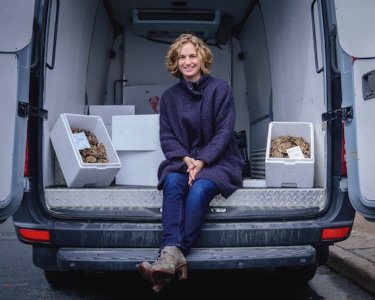Making waves: Hana Nelson (BSc’08)
By Fallon Bourgeois
Hana Nelson (BSc’08) has always been curious about the origins of food and invested in making ethical choices.
about the origins of food and invested in making ethical choices.
So in 2014, when she set out to open her business Afishionado Fishmongers, her motivation and vision were simple: to make local seafood products available to consumers, and in doing so, tell the stories of who caught the fish and where it came from.
Being surrounded by 13,000 kilometres of coastline may lead one to believe local, fresh fish from sustainable and environmentally-friendly sources is readily available to Nova Scotians. However, that’s not always the case.
“Nearly 90 per cent of seafood leaves the province to go elsewhere to be processed and sold,” says Nelson, who is a Professional Agrologist and a holds a Master’s degree in the ecology of food systems. “It seldom comes back, and when it does, we’ve lost the opportunity to know who caught our fish, where it comes from, and where it was farmed.”
As a province whose identity is intrinsically linked to the fishing industry, that reality may come as a surprise.
Testing the waters
While Nelson was determined to succeed when she first opened Afishionado, she was also cautious and aware of Halifax’s small, low-density population. She began small with a retail stand at Local Source Market on Agricola Street.
She quickly grew a loyal customer base who valued her approach to sustainable, local products. However, it was difficult to predict volume, and bring enough people through the door in a small city – enough to significantly change the face of how seafood is brought to local customers.
With over $1.6 billion in seafood exports, Nova Scotia is Canada’s number one seafood exporter. As a small business, that can be difficult to compete with. Nelson says while the benefits of export should not be overlooked, it diminishes the stories of our seafood and an opportunity for local access when it all gets exported.
“We need to process our own seafood so that we can tell its story and acknowledge the communities it came from. All the while celebrating a culture and livelihood that has sustained our province’s growth for centuries.”
Growing demand
Ultimately it was a shift from the retail stand to a weekly subscription that was the game changer for Nelson and her team.
“Suddenly we had enough volume to get these fishermen to go out and get our product and make it worthwhile,” she says. “We quickly gained 50 subscribers from our initial launch and have continued to grow.”
Today, Afishionado has over 180 subscribers and provides seafood to over 30 restaurants, which helps to cut down on waste. People can either buy online or pick up their weekly subscription at locations throughout the city, including Dalhousie.
“I chose Dal because I knew there are many people within the Dal community who see the value in what we’re doing. It’s an incredible feeling to have coastal and international ocean experts, amongst others, purchasing our products. That means a lot to me.”
Nelson says it’s also rewarding to know people not only value their product, but that Afishionado is helping to put local, sustainable seafood directly into consumers’ hands.
“We have a lot of impact on the land and agriculture, especially around harvesting food. It’s one of the most basic interactions we have every day that many of us don’t think about.”
This past January, the Afishionado team took it one step further – opening their own processing plant in Millbrook, NS. While it was thrilling to do so, Nelson says it was a necessity to overcome some of the obstacles they’ve faced.
“In Nova Scotia all product needs to go through a Canadian Food Inspection Agency (CFIA)-registered plant even for sales within the province. By opening our own CFIA-registered plant, we’re able to grow our vision and move toward a high-value, transparent and fair seafood exchange in our province.”
Women supporting women
While Nelson and her team were riding the wave of excitement of opening their own plant, Afishionado was nominated as one of the top 25 companies in Canada by SheEO, a venture capital fund for female-led and run businesses.
Nelson says being a part of the initiative has been invaluable as a business owner and a female entrepreneur.
“I don’t have a lot of female peers in my sector. But I’m confident a change is coming. As business owners, our challenges and our approach to capital are different. I want to play a role in a more collaborative, supportive network of female entrepreneurs; it’s important to have solidarity.”
And if her drive and tenacity through Afishionado are any indication, it’s clear Nelson will continue to make an incredible impact in her sector and in her quest to support other female entrepreneurs.
To learn more about Afishionado, visit: www.afishionado.ca